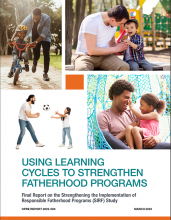Found 40 resources.
0
0
0

Federally funded Responsible Fatherhood programs work with fathers to promote healthy relationships and marriages, strengthen parenting practices, and help fathers attain economic stability. For programs to improve fathers’ outcomes, they need to be able to recruit fathers, engage them in services, and keep them actively participating in program activities. However, it is challenging for programs to achieve these participation goals. The Strengthening the Implementation of Responsible Fatherhood Programs (SIRF) study was designed to strengthen programs and build evidence on promising...
Topics: Family engagement, Healthy homes, Legislation & Policy, Low-income, Research, Stability
 Shared by Sandra Ware
on Jun 1, 2023
Shared by Sandra Ware
on Jun 1, 2023 0
0
0

In the 2020-21 school year, more than 25 million children and youth – roughly half of all elementary and secondary students in the United States – attended schools in school districts that lacked dedicated funding to identify and support students experiencing homelessness. This significant funding gap increases the likelihood that many children and youth experiencing homelessness will not be identified, and even in cases where they are identified, that they will not receive the educational protections and services that can stabilize their education and their lives. Ensuring access to these...
Topics: Early childhood, Education, Funding, Homelessness, Low-income, Research, School-readiness, Stability, Youth
 Shared by Sandra Ware
on Feb 21, 2023
Shared by Sandra Ware
on Feb 21, 2023 0
0
0
Approximately one in five adults reported experiencing household food insecurity in both spring 2020 and again in summer 2022, after a decline in reported food insecurity in spring 2021. High food price inflation, along with elevated costs for other basic needs, such as transportation and rent, have likely eroded food budgets in the last year. In addition, some of the safety net responses that buffered food insecurity in 2021 are no longer in place. In this brief, we use data from the Health Reform Monitoring Survey, a nationally representative survey of nonelderly adults, to assess food...
Topics: Food insecurity, Research, Stability
 Shared by Sandra Ware
on Oct 27, 2022
Shared by Sandra Ware
on Oct 27, 2022 0
0
0
The Vancouver Housing Authority collaborated with a Federally Qualified Health Center and a homeless crisis response system to develop a network of scattered-site and site-based supportive housing. This moderated discussion will cover how VHA paired Housing Choice Vouchers and public housing with a Medicaid-funded supportive housing benefit to serve people identified by the community’s Coordinated Entry as needing supportive housing. Speakers will also discuss the challenges faced through the process, model adjustments made, and evaluation of the work through matching housing data and...
Topics: Advocacy, CLPHA, Data sharing, Family engagement, Health, Healthy homes, Homelessness, Housing, Legislation & Policy, Low-income, Research, Stability, Sustainability
 Shared by Karina George
on Jun 17, 2022
Shared by Karina George
on Jun 17, 2022 0
0
0
Children experiencing homelessness or living in inadequate and unstable housing are exposed to many risks, including a heightened threat of involvement with the child welfare system. Can child welfare agencies play a role in addressing the lack of affordable housing? What if providing housing, plus other supportive services, could prevent out-of-home placements to foster care? What if, for those children already in foster care, it could help them reunify with their parents?
Topics: Child welfare, Research, Stability, Supportive housing
 Shared by Housing Is
on May 30, 2019
Shared by Housing Is
on May 30, 2019 0
0
0
Housing is considered a social determinant of health, with poor housing conditions being associated with poor health. Veterans with disabilities are more likely to experience a housing crisis because of combat experiences and employment instability. We identified facilitators and barriers to finding and maintaining rental housing. We sought to understand the housing needs of Veterans with military-related disabilities using the biopsychoecological model (BEM) as an organizing framework.
Topics: Disabilities, Funding, Health, Homelessness, Housing, Legislation & Policy, Research, Safety, Seniors, Stability
 Shared by Housing Is
on Mar 14, 2019
Shared by Housing Is
on Mar 14, 2019 0
0
0
Improved access to health insurance contributed to reducing worry and stress associated with paying rent/mortgage or purchasing meals among low-income people. Expanding health insurance access may have contributed to increasing the disposable income of low income groups.
Topics: Affordable Care Act, Health, Housing, Low-income, Medicaid / Medicare, Mental health, Research, Stability
0
0
0
Over the past two decades, criminal justice reform has focused on evidence-based interventions to prevent arrests and incarceration and to facilitate community reintegration. These initiatives represent a movement toward a less punitive, more holistic approach to public safety, targeting critical social factors that lead to and perpetuate criminal justice involvement. Because housing problems are often a key underlying factor for people’s involvement with the criminal justice system, there are ways housing interventions can help lessen criminal justice involvement. Decriminalizing...
Topics: Criminal justice, Homelessness, Housing, Legislation & Policy, Low-income, Research, Stability
0
0
0

For many years, the vulnerabilities of children experiencing homelessness have been glossed over on the assumption that their innate resilience would overcome the impact of homelessness. As someone who worked in the field, I would often hear, “Oh, they’ll never remember.” Today we know better. We know more about how the brain develops and about how trauma impacts brain development. There is a growing recognition among providers that these early years are critical for establishing a foundation for emotional, mental, and physical wellbeing, and that we don’t get a second chance at early...
Topics: Early childhood, Education, Homelessness, Housing, Low-income, Research, Safety, Stability
 Shared by Housing Is
on Feb 21, 2019
Shared by Housing Is
on Feb 21, 2019 0
0
0
U.S. House Committee on Financial Services, Full Committee
Topics: Funding, Homelessness, Housing, Legislation & Policy, Research, Stability
0
0
0

A long understudied facet of the American housing market, evictions have hit no area of the country harder than the South, a region home to most of the top-evicting large and mid-sized U.S. cities, according to a list released by Princeton’s Eviction Lab.
Topics: Homelessness, Housing, Research, South, Stability
0
0
0
State and local governments are debating and adopting new landlord-tenant laws and pilot programs, such as expanded legal representation and just-cause eviction requirements. Yet, few housing experts understand evictions well enough to channel the demand for change into clarity about specific eviction problems and potential solutions. Now is the time for policymakers and advocates to get smart. Here are five strategies for policymakers to consider as they address America’s eviction crisis.
Topics: Housing, Legislation & Policy, Low-income, Research, Stability
0
0
0
In response to the heightened interest in the relationship between work and the health of individuals and communities, CMCS has clarified that Medicaid funds cannot be used to pay beneficiaries’ wages, but can pay for employment counseling as an optional benefit—to help people get jobs. Years of experience with work requirements for the Supplemental Nutrition Assistance Program, Aid to Families with Dependent Children, and populations with disabilities have developed the evidence for what is needed to help different populations find and keep jobs.
Topics: Affordable Care Act, Disabilities, Health, Legislation & Policy, Low-income, Medicaid / Medicare, Research, Stability, Workforce development
0
0
0
Stricter work requirement policies for the Supplemental Nutrition Assistance Program (SNAP) at the federal level were left out of the recently passed farm bill, but state policymakers are still considering whether to expand or establish their own work requirements for SNAP and Medicaid, with the goal of incentivizing employment. There’s no question that good jobs help spur upward mobility. But if we are serious about helping people work, we have to get serious about helping people improve their skills.
Topics: Child welfare, Cost effectiveness, Dual-generation, Early childhood, Food insecurity, Legislation & Policy, Low-income, Research, Stability, Workforce development
0
0
0
Health and reentry are closely related, and chronic medical, mental health, and substance use problems make it harder for newly released people to seek employment, obtain housing, and avoid reincarceration. Compared with the general population, justice-involved people tend to be in poorer health and need access to physical and behavioral health services, as well as the know-how and motivation to get care.
Topics: Affordable Care Act, Criminal justice, Health, Legislation & Policy, Low-income, Medicaid / Medicare, Research, Stability
0
0
0
CLPHA’s Education Working Group hosts a webinar including presentations on efforts from the Chicago Housing Authority to work with residents on pursuing postsecondary opportunities, as well as an update from HUD’s Office of Policy Development & Research on data collection around tracking and increasing FAFSA utilization.
Topics: CLPHA, Cost effectiveness, Data sharing, Education, Funding, Housing, Housing Is Working Group, Low-income, Metrics, Midwest, Post-secondary, Research, Stability, Youth
0
0
0
With collectively more than 100 years of policy expertise and values-based leadership between us, Ascend at the Aspen Institute and the Housing Opportunity and Services Together initiative at the Urban Institute partnered to develop a set of recommendations on how to harness assisted housing and public-private housing partnerships for better outcomes for families.
Topics: Dual-generation, Early childhood, Education, Family engagement, Health, Housing, Low-income, Place-based, Research, Stability
0
0
0
Most states use an education funding formula to allocate state and local dollars to school districts. Most funding formulas attempt to account for student poverty, among other factors, in distributing funds. But there are several ways to count low-income students and even more ways to tie dollars to these student counts.
Topics: Child welfare, Education, Legislation & Policy, Low-income, Place-based, Research, Stability, Youth
0
0
0
There were 33,889 homeless schoolchildren in Florida during the 2007–08 school year, including children temporarily doubled up with others and children staying in hotels, motels, shelters, transitional housing, and unsheltered locations. By the 2015–16 school year, that number had risen to 72,601. This report suggests that the rise is because of the recession and foreclosure crisis, the state’s increasing shortage of affordable housing, and school districts training teachers, counselors, and other staff to identify students with no permanent housing.
Topics: Data sharing, Education, Homelessness, Housing, Low-income, Research, South, Stability, Youth
0
0
0
More than a third of homeless people are part of a family, most of which are headed by women with at least one child. Homeless families are different from single homeless people, and their needs differ. But limited research focuses on these families. This study aims to fill the gap by exploring longitudinal health service use and expenditures for homeless family members before and after entering an emergency shelter.
Topics: Family engagement, Health, Homelessness, Housing, Low-income, Preventative care, Research, Stability
0
0
0
The Enhanced Transitional Jobs Demonstration (ETJD), funded by the Employment and Training Administration of the U.S. Department of Labor, tested seven transitional jobs programs that targeted people recently released from prison or low-income parents who had fallen behind in child support payments.
Topics: Asset building, Cost effectiveness, Criminal justice, Legislation & Policy, Low-income, Research, Stability, Workforce development, Youth
0
0
0
Are families prioritizing their housing payments by jeopardizing their health and well-being, missing utility payments, skipping meals, or failing to keep up with medical needs or medical bills? And are renters less able than homeowners to weather a financial emergency, such as an unexpected medical expense? Our research suggests this may be the case.
Topics: Asset building, Child welfare, Food insecurity, Health, Homelessness, Housing, Low-income, Research, Stability
0
0
0
Researchers often have valuable insights for program leaders and policymakers. However, their research is typically presented in formats and contexts that don’t speak directly to those who can make the best use of it. With these short videos (about 3 minutes long each), we seek to bring relevant, timely research to everyone interested in reducing poverty and increasing family stability in the United States. Each video offers a few critical messages. Our hope is that these videos, and this viewer’s guide, provoke your thinking, expand your dialogue, and give you ideas for how to strategically...
Topics: Family engagement, Low-income, Research, Stability
0
0
0

Many low-income families in the United States face challenges associated with unemployment, health, and education disparities. To help overcome these challenges, several federal programs aim to assist these families with employment, self-sufficiency, healthy relationships, and individual well-being. Understanding the effects of these programs, including whether they meet the needs of those they intend to serve, requires a strong partner. Mathematica’s team of seasoned experts has worked closely with the Administration for Children and Families (ACF), Office of Planning, Research, and...
Topics: Asset building, Child welfare, Dual-generation, Family engagement, Low-income, Research, Stability
0
0
0
The evidence on how homelessness affects children suggests policymakers should be doing everything possible to prevent homelessness and, when families who do lose their housing, to help them exit homelessness and stabilize in housing quickly. Rapid re-housing (RRH) can help homeless families in crisis.
Topics: Child welfare, Health, Homelessness, Housing, Legislation & Policy, Low-income, Research, Stability
